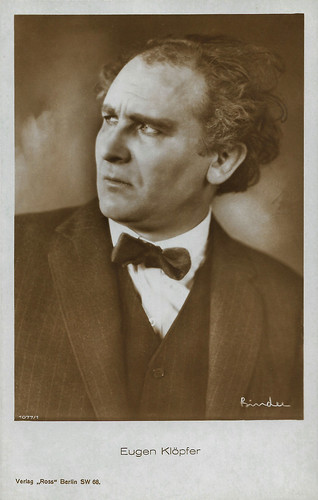
German postcard by Ross Verlag, Berlin-Wilm., no. 1077/1, 1927-1928. Photo: Alex Binder.

German collectors card by Ross Verlag in the series Vom Werden deutscher Filmkunst - Der Stumme Film, picture no. 103, group 43. Photo: Stern-Film. Eugen Klöpfer and Aud Egede Nissen in Die Strasse/The Street (Karl Grune, 1923).
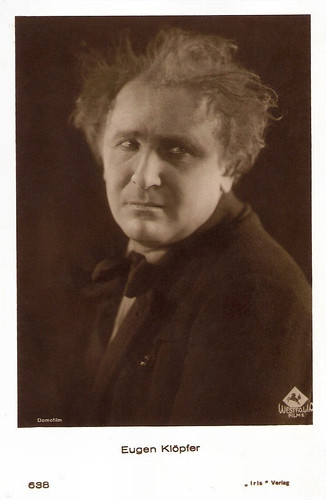
Austrian postcard by Iris Verlag, no. 638. Photo: Domofilm / Westfalia Film. Eugen Klöpfer in Elegantes Pack/The Elegant Bunch (Jaap Speyer, 1925).

German postcard by Ross Verlag, no. 148/1. Photo: K. Ewald / Oswald-Film /SF. Paul Wegener as the murderer, Eugen Klöpfer as the principal physician and Maria Koppenhöfer as Her Highness in Unheimliche Geschichten/Uncanny Stories (Richard Oswald, 1932).
One of the favourite actors of Max Reinhardt
Eugen Gottlob Klöpfer was born in 1886 in the Talheim residential area of Rauher Stich, Heilbronn. He was the youngest of eleven children of the farmer and innkeeper Karl Klöpfer and his wife Karoline, née Hörsch. Eugen attended the Realschule (secondary school) in Heilbronn. He subsequently attended the Lateinschule (Latin School) in Lauffen and then the Karlsgymnasium in Heilbronn.
Although he started an apprenticeship with a lumber business in Munich, Klöpfer soon discovered that his passion was the theatre. He joined the Theatre Association of Munich and performed at various provincial theatres. In 1905 he was cast in his first role in Landshut, afterwards playing in Ingolstadt and Biel.
In 1909 he came to the Volkstheater München (Munich People's Theatre). From 1914 to 1918, he performed in Colmar, Erfurt, Bonn and Frankfurt am Main. After the First World War, Klöpfer relocated to Berlin. There he played from 1920 to 1923 at the Deutsches Theater and soon belonged to the favourite actors of Max Reinhardt's ensemble.
From 1925, he played on various stages in Vienna and Salzburg. Finally, he toured Europe and South America. He played the title role in Carl Zuckmayer's 1927 play 'Schinderhannes'. From 1919 he appeared in many silent films like Die Arche/The Arc (Richard Oswald, 1919) and Menschen (Martin Berger, 1920) with Bernhard Goetzke. He acted under the direction of F. W. Murnau in Der brennende Acker/The Burning Soil (Friedrich Wilhelm Murnau, 1922) with Werner Krauss and Lya de Putti.
Klöpfer often acted in leading or heroic roles. These included Boris Godunow in Der falsche Dimitri/The False Dimitri (Hans Steinhoff, 1922) and the title role in Götz von Berlichingen zubenannt mit der eisernen Hand/Götz von Berlichingen and the Iron Hand (Hubert Moest, 1925), based on the historical play by Johann Wolfgang von Goethe, set in the Holy Roman Empire.
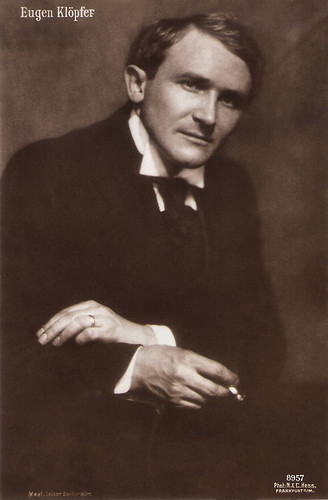
German postcard by Verlag Leiser, Berlin-Wilm., no. 8957. Photo: N. & C. Hess, Frankfurt a/M.
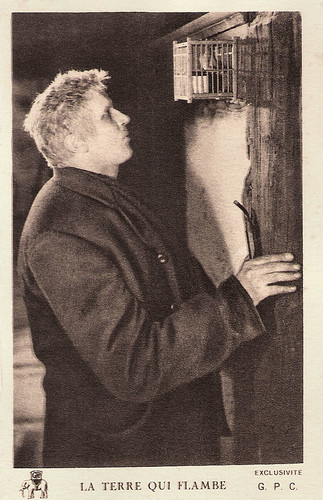
French postcard by Edition de la Cinématographie Française, Paris. Photo: G.P.C. Eugen Klöpfer in Der brennende Acker/Burning Soil/La terre qui flambe (Friedrich Wilhelm Murnau, 1922). Maria works in the household of Peter Rog (Eugen Klöpfer) and his father. Peter is in love with her and wants to marry her, but she instead loves his younger brother Johannes.
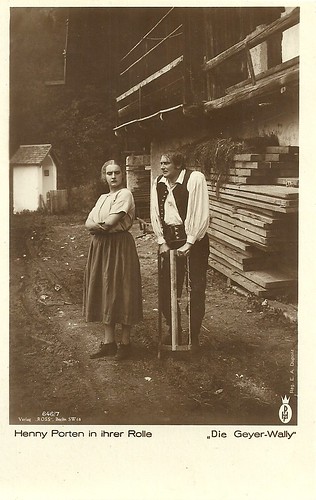
German postcard by Ross Verlag, no. 646/7, 1919-1924. Photo: HPF (Henny Porten Film). Henny Porten as Wally and Eugen Klöpfer as Vincenz in Die Geyer-Wally/Die Geier-Wally/Vulture Wally (E.A. Dupont, 1921), based on the novel by Wilhelmine von Hillern. The sets were designed by Paul Leni.
Gottbegnadet by Adolf Hitler
After the Nazi seizure of power, Eugen Klöpfer was promoted to the Presiding Board of the Reich Film Chamber, under Joseph Goebbels, and was also chairman of Goebbels' artist donation. He also appeared in the Propaganda film Flüchtlinge/Refugees (Gustav Ucicky, 1933) with Hans Albers and Käthe von Nagy. It detailed the plight of ethnic Germans, known as 'Volga Germans', in the Soviet province of Manchuria.
In 1934, Klöpfer was designated as a 'Staatsschauspieler' (actor of national importance). He was also appointed the director of the Volksbühne (People's Theatre) in Berlin. In 1935 he was appointed Vice President of the Ministry of Arts and joined the board of Ufa. In 1936 he was appointed general director of Berlin's Theater am Nollendorfplatz. In 1937, Klöpfer joined the Nazi Party.
In 1940, he played the role of Landschaftskonsulenten Sturm in Veit Harlan's anti-Semitic Nazi propaganda film Jud Süß/Jew Süss (Veit Harlan, 1940). In August 1944, towards the end of the Second World War, Klöpfer was added by Adolf Hitler to the 'Gottbegnadeten-Liste', a list of important German artists, which exempted him from military service, including service on the home front.
After 1945, Eugen Klöpfer was banned and spent two months in prison in 1948. After a denazification trial, he was exonerated from the charge of complicity in the tragic death of Joachim Gottschalk. In 1949, he began performing again with his own ensemble in Cologne and Neustadt in der Pfalz.
Eugen Klöpfer died in 1950 in Wiesbaden, Hesse, of pneumonia. His grave is located in the South Cemetery in Wiesbaden. He was 63. Klöpfer had a long-term relationship with the actress Flockina von Platen.
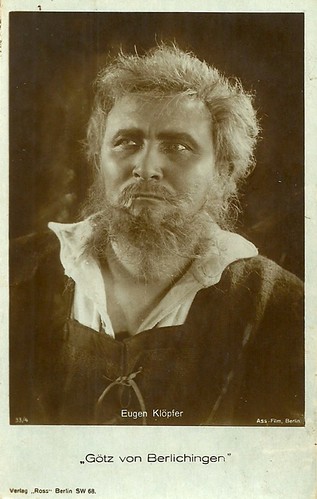
German postcard by Ross Verlag, no. 33/4. Photo: Ass-Film, Berlin. Eugen Klöpfer in Götz von Berlichingen zubenannt mit der eisernen Hand (Hubert Moest, 1925).
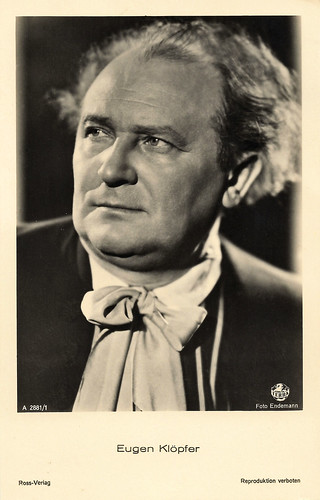
German postcard by Ross Verlag, Berlin-Wilm., no. A 2881/1, 1939-1940. Photo: Endemann / Terra. Eugen Klöpfer probably in Die fremde Frau/The Strange Woman (Roger von Norman, 1939).
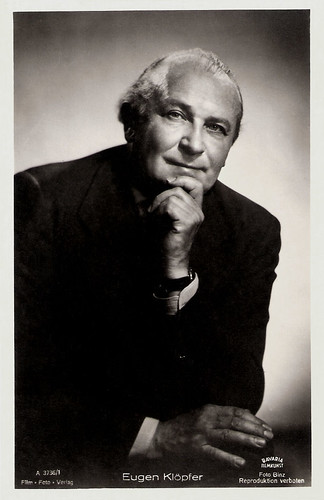
German postcard by Film-Foto-Verlag, no. A 3736/1, 1941-1944. Photo: Binz / Bavaria Filmkunst.
Sources: Wikipedia (English and German), and IMDb.
No comments:
Post a Comment